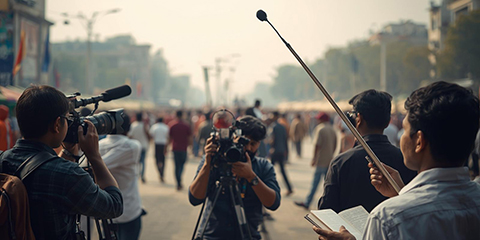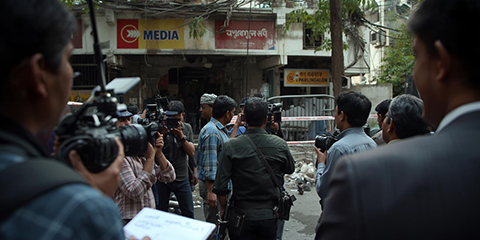Breaking into the media industry: Your step-by-step guide to journalism
JournalismPakistan.com | Published 2 years ago
Join our WhatsApp channel
ISLAMABAD—Media and journalism have undergone significant changes over the past few decades. With the advent of digital media, the way we consume news and information has transformed, making the world a much more connected and informed place. But with so many media outlets and journalistic practices out there, it can be hard to know where to start if you're looking to get into media and journalism. In this blog, we’ll provide you with a step-by-step guide to media and journalism, covering everything from the basics of reporting to the latest media trends. So, let’s dive in!
What is media and journalism?
Media and journalism refer to the channels through which information is shared with the public. This can include print, television, radio, and digital media. Journalism, in particular, is the practice of gathering, evaluating, and reporting news and information.
The basics of reporting:
Reporting is a critical component of journalism. It involves gathering information, interviewing sources, and fact-checking to ensure accuracy. To be a successful reporter, you must be able to write compelling stories that are informative and engaging to your audience. The key to good reporting is to ask the right questions and to be persistent in your search for the truth.
Writing for media:
Writing for media involves a different style of writing compared to other forms of writing. It’s essential to use concise language that can quickly capture the reader's attention. You should also write in a way that is easy to understand and avoids jargon that can confuse readers.
Investigative journalism:
Investigative journalism is an in-depth form of reporting that involves uncovering hidden information, exposing wrongdoing, and holding those in power accountable. This type of journalism requires a high level of skill and dedication, as well as a commitment to seeking out the truth, even when it's difficult to find.
Broadcast journalism:
Broadcast journalism refers to news reporting that is broadcast over the radio, television, or other electronic media. This type of journalism requires reporters to have excellent communication skills, as they need to deliver news concisely and engagingly to their audience.
Digital media:
Digital media refers to any media that is distributed through digital channels, such as social media, websites, and mobile apps. With the rise of digital media, there are many opportunities for aspiring journalists to get their work seen by a wider audience.
Ethics in journalism:
Ethics in journalism are essential to maintain the integrity and trust of the public. Journalists must abide by a code of ethics that governs their behavior and ensures they act in the best interest of their readers. This includes avoiding conflicts of interest, protecting sources, and maintaining accuracy in their reporting.
Media outlets:
Media outlets are the channels through which news and information are distributed to the public. This can include traditional outlets such as newspapers, television, and radio, as well as newer digital outlets such as blogs, podcasts, and social media.
Media coverage:
Media coverage refers to how news and events are reported by the media. This can include the angle taken, the sources used, and the overall tone of the reporting. Journalists need to provide balanced and fair coverage of events, as this is crucial to maintaining public trust.
Media trends:
Media trends are the changes and developments that are taking place in the media landscape. This can include the rise of social media, the decline of traditional media outlets, and the increasing importance of digital media.
Media careers:
There are many career paths available in media and journalism. Media careers can encompass a wide range of roles, from reporters and editors to social media managers and content creators. Some popular careers in media include journalism, public relations, advertising, and marketing. These careers require strong communication skills, critical thinking abilities, and the ability to work well under pressure. With the rise of digital media, there are also many opportunities for individuals with technical skills, such as web designers and data analysts. A career in media can be rewarding and exciting, offering the chance to inform and engage audiences while making a positive impact on society.
Frequently Asked Questions:
1. What skills do I need to become a journalist?
To become a journalist, you need to have excellent writing skills, strong communication skills, and the ability to conduct research and interviews. You should also have a passion for storytelling and a willingness to learn about the world around you.
2. What is investigative journalism?
Investigative journalism is a form of reporting that involves in-depth research and uncovering hidden information, often related to government or corporate corruption. This type of journalism requires tenacity, persistence, and a commitment to seeking out the truth.
3. How has digital media changed journalism?
Digital media has transformed the way in which news and information are distributed and consumed, leading to a rise in social media, blogs, and other digital platforms. This has created new opportunities for journalists to connect with audiences and report on events in real-time.
4. What are the different types of journalism?
The main types of journalism include investigative journalism, broadcast journalism, digital media, and print journalism. Each type of journalism has its own unique characteristics and requires different skills and expertise.
5. How do journalists ensure accuracy in their reporting?
Journalists ensure accuracy in their reporting by fact-checking their sources, verifying information through multiple sources, and avoiding personal biases. It's important for journalists to maintain a high level of accuracy to build trust with their audience.
6. What is the role of ethics in journalism?
Ethics in journalism are essential to maintain the integrity and trust of the public. Journalists must follow a code of ethics that governs their behavior and ensures they act in the best interest of their readers. This includes avoiding conflicts of interest, protecting sources, and maintaining accuracy in their reporting.
7. How do I get started in a career in journalism?
To get started in a career in journalism, you should consider earning a degree in journalism, gaining experience through internships or freelance work, and building a portfolio of your work. You should also network with other journalists and professionals in the field.
8. What are the challenges facing the media industry today?
The media industry is facing many challenges today, including declining revenue for traditional media outlets, the rise of fake news and misinformation, and the increasing influence of social media on news and information.
9. How important is storytelling in journalism?
Storytelling is a critical component of journalism, as it allows journalists to engage and inform their audience through compelling and informative narratives. Strong storytelling can help to build trust and credibility with readers, making it an essential skill for any journalist.
10. What role does media play in society?
Media plays a vital role in society, informing and engaging the public on important issues and events. It can also help to hold those in power accountable and give a voice to marginalized communities. Media has the power to shape public opinion and influence political discourse, making it an important force for social change.

























